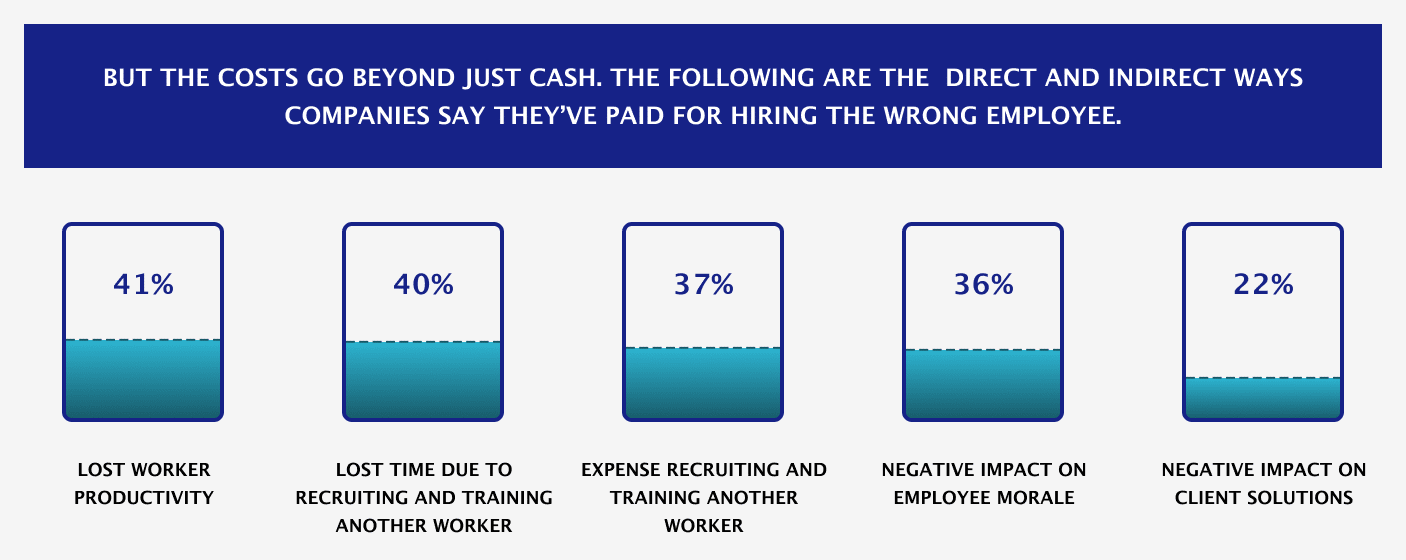Research shows that a bad hire leads not only to a significant financial cost, but it can also affect productivity and employees’ morale.
But finding the right people for the job is often easier said than done. The hiring process includes a lot of guessing. Resumes are filled with lies, and most people have become versed in impressing the recruiters with the right answers. Most of the candidates who make the final cut do so by tricking the screening process. In the end, an employer is left trying to find the right fit based on subjective preferences and instinct.
But, by hiring the wrong person, an employer will have to invest a lot of time, energy, and resources to fit them into the company. Eventually, they may turn into adequate employees, but more often than not, the employer will be forced to let them go.
Either way, a bad hire can impact a company severely. Here’s how.
1. Financial Costs
The online clothes and shoe store, Zappos, is paying up to $2,000 to bad hires to leave the company. The hiring process, on the other hand, is extremely slow and precise.
So, where did this obsession of working only with the right people come from?
According to Zappos CEO Tony Hsieh, bad hires had cost the company about $100 million. Although the number might sound exorbitant, it’s not far from the truth. According to the U.S Department of Labor, the average cost of a bad hire equals around 30% of the employee’s first-year earnings. That means that a single bad hire with an annual salary of $50,000 can cost the company up to $15,000. More than that, a recent survey performed by CareerBuilder has found that more than half of the 6,000 employers questioned have felt the effects of a bad hire.
Not only is the company paying a salary to someone who is not performing to expectations, but they are also investing in their training. If the company ends up firing the employee, they may be responsible for severance pay, and other potential legal costs. Not to mention the costs of searching for a replacement, training them, and so on.

2. Productivity Loss
All the time spent on a bad hire can impact productivity and ultimately, the company’s bottom line. According to a report, 39% of financial managers admitted that bad hires had cost them productivity. More than that, 11% of them claimed that a bad hire led to fewer sales. The survey also showed that managers and supervisors spend up to 17% of their time dealing with under-performing employees. That accounts to up to one day per week cleaning after someone else’s mess.
3. A Bad Hire Can Bring Down a Team
While managers spend time and resources to correct the mistake of hiring the wrong person, the rest of the team suffers. It’s hard to stay engaged and motivated when one team member requires special attention from the manager.
According to one survey, 95% of the supervisors questioned said that hiring the wrong person had a strong impact on the morale of the team, and 35% of them claimed that a bad hire can impact employees’ morale negatively.
Why does that happen?

More often than not, a bad hire is unable to fit into the organization. Because of personality conflicts, they don’t get along with the rest of the team. This can lead to tension, problems, and productivity loss.
The recruiting and hiring process is tedious and unpleasant. Employers often rush into the decision of hiring someone to put an end to the seemingly endless cycle of resumes, phone, calls, and interviews. But, as numerous studies have shown, the cost of a bad hire will affect not only a company’s bottom line but also the morale of its employees.
What we can do to help
Using a staffing agency like The TemPositions Group of Companies is a great way to minimize the risk of making a bad hire. We are experts in the hiring process and with very large pools of not only active but also passive candidates to choose from. We have access to potential hires that most companies do not. Most agencies will guarantee their hire. If you are not satisfied with the person, they will offer to replace that person free of charge within a certain amount of time after the hire starts working. Finally, we have specialized divisions, focusing on specific fields. Our department leads understand the nuances of those fields more than a human resources professional that is responsible for general hiring.






